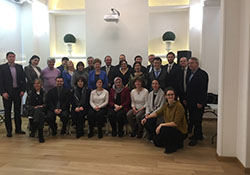Workshop on cancer screening and early diagnosis for limited-resource countries held in Turin

WHO
On 12–14 December 2016 in Turin, Italy, WHO/Europe hosted a workshop on cancer screening and early diagnosis in partnership with the Reference Centre for Epidemiology and Cancer Prevention in Piedmont (CPO) and a WHO Collaborating Centre. The workshop featured 9 international experts, including 2 from the CPO and 2 from the International Agency for Research on Cancer, and engaged 15 participants from Albania, Azerbaijan, Belarus, Kazakhstan, Montenegro, the Palestinian territories, the Republic of Moldova, Serbia and Uzbekistan. For most participants, this was their first workshop on the early detection of cancer.
The objectives of the workshop were:
- to present and discuss key elements of cancer screening and early diagnosis in limited-resource settings, in particular quality, monitoring and evaluation; and
- to promote the exchange of experiences and networking within countries.
On the first day of the workshop, country representatives presented their current situations to the group and experts gave lectures explaining the technical aspects of early diagnosis and screening. The second day featured thematic group sessions, in which 2 experts and 2 countries explored a theme in detail, and a tour of Turin’s cancer screening programme. The final day included expert feedback on group sessions and general discussion.
Participants discussed both screening – aimed at identifying cancers before symptoms appear ¬– and early diagnosis – aimed at diagnosing and treating patients as soon as symptoms appear. Experts underlined the importance of ensuring early diagnosis before investing in screening programmes. They pointed out that improving care services (diagnosis and treatment) and patient pathways for people with symptoms is a cost-effective way to reduce cancer mortality. It also ensures that when a screening programme is introduced, diagnosis and treatment services are ready to provide appropriate assistance to those screened positive.
The feedback from participants at the end of the workshop was highly positive. They particularly appreciated experts’ guidance on how to introduce or improve early diagnosis and screening programmes according to the resources available.
The workshop was made possible by funding from the Ministry of Health of the Russian Federation.



